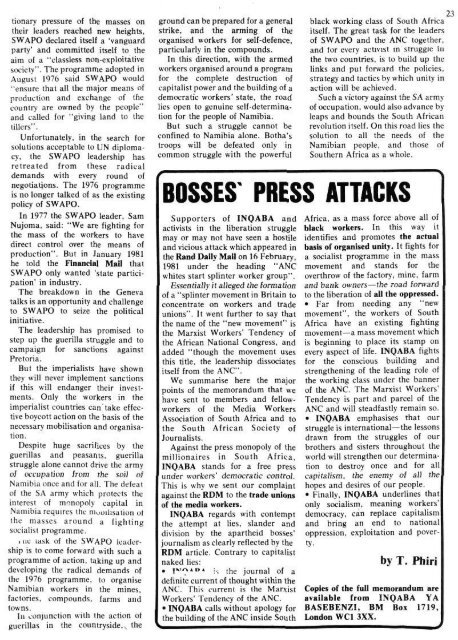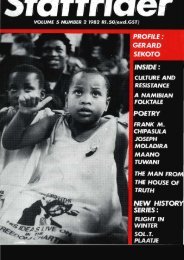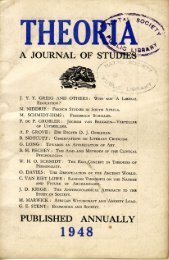Inqaba ya basebenzi Number 2 April 1981 - DISA
Inqaba ya basebenzi Number 2 April 1981 - DISA
Inqaba ya basebenzi Number 2 April 1981 - DISA
Create successful ePaper yourself
Turn your PDF publications into a flip-book with our unique Google optimized e-Paper software.
tionary pressure of the masses on<br />
their leaders reached new heights,<br />
SWAPO declared itself a 'vanguard<br />
party* and committed itself to the<br />
aim of a "classless non-exploitative<br />
society". The programme adopted in<br />
August 1976 said SWAPO would<br />
"ensure that all the major means of<br />
production and exchange of the<br />
country are owned by the people"<br />
and called for "giving land to the<br />
tillers".<br />
Unfortunately, in the search for<br />
solutions acceptable to UN diplomacy,<br />
the SWAPO leadership has<br />
retreated from these radical<br />
demands with every round of<br />
negotiations. The 1976 programme<br />
is no longer talked of as the existing<br />
policy of SWAPO.<br />
In 1977 the SWAPO leader, Sam<br />
Nujoma. said: "We are fighting for<br />
the mass of Ihe workers to have<br />
direct control over the means of<br />
production". But in January <strong>1981</strong><br />
he told the Financial Mail that<br />
SWAPO only wanted 'state participation'<br />
in industry.<br />
The breakdown in the Geneva<br />
talks is an opportunity and challenge<br />
to SWAPO to seize the political<br />
initiative.<br />
The leadership has promised to<br />
step up the guerilla struggle and to<br />
campaign for sanctions against<br />
Pretoria.<br />
But the imperialists have shown<br />
they will never implement sanctions<br />
if this will endanger their investments.<br />
Only the workers in the<br />
imperialist countries can" take effective<br />
boycott action on the basis of the<br />
necessary mobilisation and organisation.<br />
Despite huge sacrifices by the<br />
guerillas and peasants, guerilla<br />
struggle alone cannot drive the army<br />
of occupation from the soil of<br />
Namibia once and for all. The defeat<br />
of the SA army which protects the<br />
interest of monopoly capital in<br />
Namibia requires the muoihsation ol<br />
the masses around a fighting<br />
socialist programme.<br />
. IIC task of the SWAPO leadership<br />
is to come forward with such a<br />
programme of action, taking up and<br />
developing the radical demands of<br />
the 1976 programme, to organise<br />
Namibian workers in the mines,<br />
factories, compounds, farms and<br />
towns.<br />
In conjunction with the action ol<br />
guerillas in the countryside. s the<br />
ground can be prepared for a general<br />
strike, and the arming of the<br />
organised workers for self-defence,<br />
particularly in the compounds.<br />
In this direction, with the armed<br />
workers organised around a program<br />
for the complete destruction of<br />
capitalist power and the building of a<br />
democratic workers' state, the road<br />
lies open to genuine self-determination<br />
for the people of Namibia.<br />
But such a struggle cannot be<br />
confined to Namibia alone. Botha's<br />
troops will be defeated only in<br />
common struggle with the powerful<br />
black working class of South Africa<br />
itself. The great task for the leaders<br />
of SWAPO and the ANC together,<br />
and for every activist in struggle in<br />
the two countries, is to build up the<br />
links and put forward the policies,<br />
strategy and tactics by which unity in<br />
action will be achieved.<br />
Such a victory against the SA army<br />
of occupation, would also advance by<br />
leaps and bounds the South African<br />
revolution itself. On this road lies the<br />
solution to all the needs of the<br />
Namibian people, and those of<br />
Southern Africa as a whole.<br />
BOSSES PRESS ATTACKS<br />
Supporters of INQABA and<br />
activists in the liberation struggle<br />
may or may not have seen a hostile<br />
and vicious attack which appeared in<br />
the Rand Daily Mail on 16 February,<br />
<strong>1981</strong> under the heading "ANC<br />
whites start splinter worker group".<br />
Essentially it alleged the formation<br />
of a "splinter movement in Britain to<br />
concentrate on workers and trade<br />
unions". It went further to say that<br />
the name of the "new movement" is<br />
the Marxist Workers' Tendency of<br />
the African National Congress, and<br />
added "though the movement uses<br />
this title, the leadership dissociates<br />
itself from the ANC".<br />
We summarise here the major<br />
points of the memorandum that we<br />
have sent to members and fellowworkers<br />
of the Media Workers<br />
Association of South Africa and to<br />
the South African Society of<br />
Journalists.<br />
Against the press monopoly of the<br />
millionaires in South Africa,<br />
INQABA stands for a free press<br />
under workers' democratic control.<br />
This is why we sent our complaint<br />
against the RDM to the trade unions<br />
of the media workers.<br />
INQABA regards with contempt<br />
the attempt at lies, slander and<br />
division by the apartheid bosses'<br />
journalism as clearly reflected by the<br />
RDM article. Contrary to capitalist<br />
naked lies:<br />
• IV£* D * !•. ihe journal of a<br />
definite current of thought within the<br />
ANC. This current is the Marxist<br />
Workers' Tendency of the ANC.<br />
• INQABA calls without apology for<br />
the building of the ANC inside South<br />
Africa, as a mass force above all of<br />
black workers. In this way it<br />
identifies and promotes the actual<br />
basis of organised unity. It fights for<br />
a socialist programme in the mass<br />
movement and stands for the<br />
overthrow of the factory, mine, farm<br />
and bank owners—the road forward<br />
to the liberation of all the oppressed.<br />
• Far from needing any "new<br />
movement", the workers of South<br />
Africa have an existing fighting<br />
movement—a mass movement which<br />
is beginning to place its stamp on<br />
ever>' aspect of life. INQABA fights<br />
for the conscious building and<br />
strengthening of the leading role of<br />
the working class under the banner<br />
of the ANC. The Marxist Workers*<br />
Tendency is part and parcel of the<br />
ANC and will steadfastly remain so.<br />
• INQABA emphasises that our<br />
struggle is international—the lessons<br />
drawn from the struggles of our<br />
brothers and sisters throughout the<br />
world will strengthen our determination<br />
to destroy once and for all<br />
capitalism, the enemy of all the<br />
hopes and desires of our people.<br />
• Finally. INQABA underlines that<br />
only socialism, meaning workers'<br />
democracy, can replace capitalism<br />
and bring an end to national<br />
oppression, exploitation and poverty-<br />
by T. Phiri<br />
Copies of the full memorandum are<br />
available from INQABA YA<br />
BASEBENZI, BM Box 1719,<br />
London WC1 3XX.
















